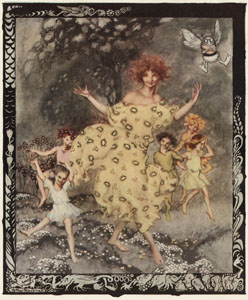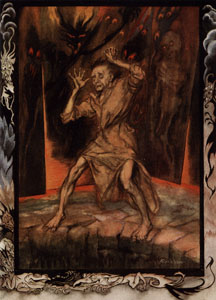Literature often provides avenues for an artist to let go of reality and plunge into the depths of imagination. From the story of Salome and her dance for the head of John the Baptist to Parsifal’s search for the Holy Grail, no avenue for an artist’s imagination was closed. Harry Clarke’s take on Edgar Allen Poe moved further into the dark side of the author’s imagination than Rackham chose to attempt. Yet the impact on the reader does not change: the fear of the mysterious that enthralled Poe is imagined in scenes designed by the artist to add thrills to his words. Compare these images with those from The Goblin Market, Snickerty Nick and the Bletherwitch, and the Witch’s Kitchen: here Rackham’s genius for image brings the reader to the same conclusion: phantoms do exist, at least in the imagination.

|

|

|
|
Julia Ellsworth Ford and Arthur Rackham
Dance of Spring from Julia Ellsworth Ford’s Snickerty Nick and the Giant Moffat, Yard & Co. 1919 6 in. x 5 in. 39h15247 Baldwin Library of Historical Children’s Literature |
Oscar Wilde and Aubrey Beardsley
The dancer’s reward from Oscar Wilde’s Salome John Lane, the Bodley Head 1920 7 in. x 5 in. PR5820 .S2 F7 Harold and Mary Jean Hanson Rare Book Collection |
Edgar Allan Poe and Arthur Rackham
At length for my seared and writhing body there was no longer an inch of foothold on the firm floor of the prison from Edgar Allan Poe’s Tales of Mystery and Imagination George G. Harrap & Co. Ltd. 1935 7 ¼ in. x 5 ¼ in. PS2602 1935b Harold and Mary Jean Hanson Rare Book Collection |


